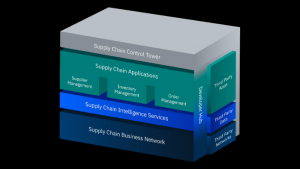

Juan Andres Pro Dios, CIO, El Corte Ingles said: “The complex, global nature of our omni-channel operations presents a significant supply chain challenge that could be turned into a business opportunity, if the right technology is applied.
“The IBM Sterling Supply Chain Suite provides open development capabilities that let us quickly tailor solutions to meet our unique business needs. This allows us to embrace operational complexity while optimizing operational performance and improving omni-channel customer experiences.”
Open, trusted collaboration
IBM believes the global economy is becoming ever more reliant on the interactions of connected companies. These need to access data troves from sources as varied as IoT, GPS positioning and continuous weather monitoring. In such a data-rich environment, the potential business value of modern supply chains is increasing.
Yet, critical business relationships often hinge on continuous collaboration, transparency and trust to succeed. While some applications and processes remain safely tucked inside enterprise data centres, others are finding cloud-based ways to exploit AI-enabled open collaboration between buyers, suppliers and customers. In effect, enterprises are searching for ways to make their supply chains:
- smarter
- more efficient
- better able to make decisions.
The objective is to facilitate rapid adjustments to disruptions and to opportunities. This matters in an era where globalisation (and de-globalisation – like that potentially represent by Brexit or the selective imposition of trade tariffs) has made supplier networks simultaneously both more complex and vulnerable.

Bob Lord, Senior Vice President, Cognitive Applications and Developer Ecosystems, IBM said: “Supply chains are now mission-critical systems for all businesses to drive success and profitability.
“Many organizations have risen to the top of their industries by building efficient and agile supply chains. By modernizing supply chains on top of open, hybrid-cloud platforms and infusing Watson AI, IBM Blockchain and IoT into their networks, the IBM Sterling Supply Chain Suite can help companies across all industries enter a new era of global competitiveness. IBM sees a $50 billion market in technologies that will enable global businesses to digitally transform their supply chains. IBM means to be number one in that market.”
The IBM Sterling Supply Chain Suite approach
IBM built this Sterling Supply Chain Suite on a foundation of the Sterling B2B Network and Sterling Order Management products. These enable manufacturers, retailers and other types of businesses to:
- integrate data, business networks and supply chain processes
- capitalise on the benefits of technologies like Watson AI, IBM Blockchain and the Internet of Things (IoT).
Such ‘intelligent, self-correcting’ supply chains, in addition to opening up competitive advantages:
- learn from experience
- deliver greater reliability
- provide transparency with security.
On launch, IBM is delivering a secured, open platform with hybrid-cloud support which enables organisations to integrate:
- their own data and networks
- the data and networks of suppliers and customers.

“Publicis Sapient’s global brand is tested daily in our client engagements as we collaborate to modernize purpose-built supply chain solutions. Speed and delivery are essential to our shared success,” said Chris Davey, Chief Strategist, Publicis Sapient.
“How we transform supply chain is in the ability to quickly customize solutions by empowering clients with APIs, reusable assets and connectors to incorporate third-party applications and data, while connecting to critical business networks to extend the IBM Sterling Supply Chain Suite in ways that drive competitive differentiation for our clients.”
Innovation
IBM’s open platform connects to each supply chain’s unique supplier ecosystem. Claimed innovations include:
- trusted connectivity
- real-time intelligence
- accessibility to developers
- hybrid-cloud integration
Trusted connectivity, built to scale, comes from the IBM Blockchain. The IBM Sterling Supply Chain Suite provides secured connectivity and collaboration with customers, partners and suppliers so that enterprises can leverage IBM Sterling’s existing multi-enterprise business network. The latter is significant because it:
- comprises a community of >800K preconnected trading partners
- already executes 3B transactions a year.
Applications (and control towers), embedded with AI and trained specifically for supply chain use, provide:
- end-to-end visibility
- real-time alerts
- recommendations
- automation for self-correcting actions.
Enterprises using individual Sterling applications in their supply chain, for example the IBM Sterling Fulfillment Optimizer with Watson, are lowering the shipping cost/per order by some 7% (according to IBM). IBM has deployed these Sterling capabilities within its own global supply chain; it says this reduces disruption mitigation time from days to hours, and is 95% more efficient at tackling recurring supply chain challenges.
Opportunities for developers
The IBM Sterling Supply Chain Suite Open to developers to create tailored solutions which:
- allow systems integrators and developers to build, extend and integrate tailored supply chain solutions that can interoperate with other business networks and applications
- enable clients to bring in third party data, so that all connected applications and networks can benefit.
To help solve unique supply chain challenges, the Suite’s Developer Hub has:
- a global community of developers
- open-source programs
- a library of knowledge resources.
Hybrid-cloud integration extends existing supply chain investments. Instead of requiring time-consuming and expensive migrations, the Suite’s offers an enterprise-ready approach with containerised software along with IBM Cloud Paks. The idea is that these enable enterprises to extend the value and reach of legacy applications and data. Such a hybrid approach should mean that enterprises have:
- the freedom to choose where to run workloads
- the ability to link these to value-added services in the IBM Sterling Supply Chain Suite.
For example, once certified, IBM Sterling Order Management containers for Red Hat OpenShift will be able to run their software in their own data centre – or in any cloud.
Enterprise Times: what does this mean
IBM says the IBM Sterling Supply Chain Suite seeks to “empower IT and supply chain professionals with greater visibility, transparency and trust to proactively predict and mitigate disruption, improve B2B information flow, and optimize inventory utilization and fulfillment“. If proven this will be valuable in an increasingly uncertain supply chain environment. For IBM Sterling product users, this hybrid access to blockchain and AI extends capabilities they already possess – and within an established supply chain community.
But, but, but… The number of supply chain initiatives in which IBM participates is growing by the year. While this is an IBM Sterling-based development, or extension, it likely obliges supply chain customers to undertake deep research before making choices. it would be more interesting, for Enterprise Times at least, if the IBM Sterling Supply Chain Suite announcement had made explicit links to Trust Your Supplier, Food Trust, Batavia and other initiatives.

























